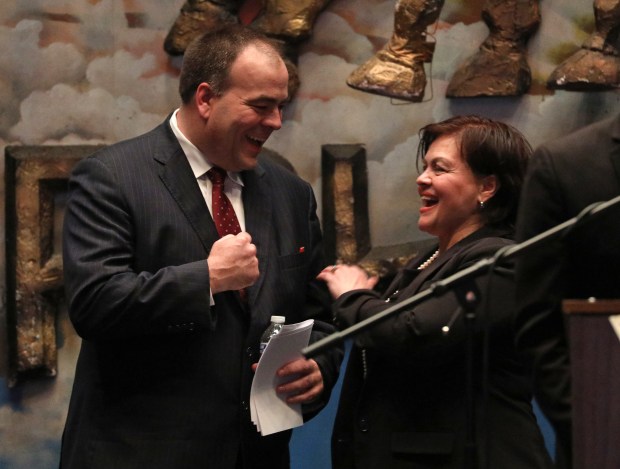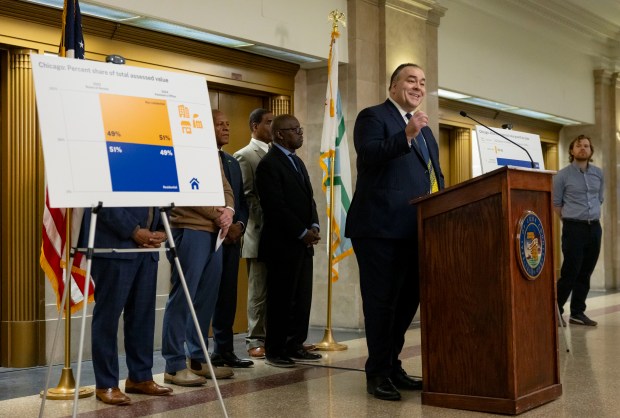Assessor Fritz Kaegi has “clearly improved” the fairness of Cook County’s property tax assessment system over his two terms, according to a new study crediting his office with reversing problems that led to the overvaluation of lower-priced homes and the undervaluation of high-priced homes.
Those changes brought the office “within industry standards” for fairness in assessing homes “for the first time in years,” according to the report by University of Chicago professor Christopher Berry.
Now up for a third term, Kaegi has certainly made the system more fair by treating more homeowners equally, but has not necessarily become more accurate, the report said. Compared with sales prices, residential properties “are increasingly under-assessed on average,” it found.
Berry, director of the U. of C.’s Mansueto Institute for Urban Innovation, acknowledged taxpayers might be skeptical of the findings. “How can Kaegi be making assessments more fair, when my tax bill is going up?” Berry said in an interview with the Tribune.
Homeowners were unlikely to feel the difference because property tax levies set by local governments each year have continued to rise, he noted. The city of Chicago’s levy has gone up by 19% since 2018. The Chicago Public Schools levy has gone up by 24%.
Even so, “the important thing is the assessments don’t determine whether tax bills are going up or down on average, just how it’s spread amongst properties,” Berry said.
Many other factors play into how bills are ultimately calculated. Tax breaks shift the burden between properties by billions each year. So do the final assessments for big commercial properties. Berry’s study focused on homes, smaller apartments, and condos and did not include larger apartment buildings, nor other commercial properties like warehouses, factories and stores.
Berry has studied property assessment and taxation issues nationally and in Cook County. In 2010, he was tapped to help develop an assessment model for the assessor’s office to improve fairness and accuracy. It was never fully implemented under Kaegi’s predecessor, Joe Berrios, a Tribune and ProPublica investigation found.
That meant “residents in working-class neighborhoods were more likely to receive property tax bills that assumed their homes were worth more than their true market value,” the Tribune reported, while homeowners in wealthier and mostly white areas “caught a break because property taxes weren’t based on the full value of their homes.”
 Candidate for Cook County Assessor Fritz Kaegi celebrates with “Chuy” Garcia’s wife, Evelyn Chinea as he wins the nomination for Cook County Assessor on election night celebration, March 20, 2018 in Chicago. (Erin Hooley/Chicago Tribune)
Candidate for Cook County Assessor Fritz Kaegi celebrates with “Chuy” Garcia’s wife, Evelyn Chinea as he wins the nomination for Cook County Assessor on election night celebration, March 20, 2018 in Chicago. (Erin Hooley/Chicago Tribune)
Those findings contributed to Berrios’ electoral defeat and Kaegi’s victory in 2018. He won again in 2022.
Despite that incumbency, Cook County Democrats opted earlier this summer to endorse someone else, Lyons Township Assessor Pat Hynes, in the March 2026 primary election. Several party officials argued Kaegi’s valuations were unpredictable and faulted his management of certain tax breaks.
Hynes has also argued the misclassification of hundreds of properties and other suburban over-assessments by Kaegi’s office also suggest there are broader problems with his practices.
But one of Kaegi’s top arguments is that he’s improved on Berrios’ “regressive” assessments. The analysis does include a mix of modelings that Kaegi inherited that were phased out in his first three years in office. His first year in 2019, for example, Berrios’ model was still in place.
“Under the old system, when mansions and luxury condos weren’t taxed at their real value, working-class families had to make up for it. It was like Robin Hood in reverse,” Kaegi said in a Friday release celebrating their success in fixing “that fundamental unfairness.”
Berry’s study found on average the lowest-valued homes were assessed at 125% of what they’d actually fetch on the market during Berrios’ last term, while the most expensive homes were assessed at only 82% of their sales prices. It was a similar story for the lowest-priced condos.
Regressive assessments lead to high-value homeowners paying too little and low-value homeowners paying too much when bills are calculated. During Berrios’ first and second terms, the most valuable homes — in the top 10% — were undertaxed by $1.7 billion, Berry found after comparing actual tax bills with what the bills would have been if the assessment had matched comparable sales prices. That analysis did not include the impact of exemptions.
“Tax shifting has been dramatically reduced and nearly eliminated under Kaegi,” according to the report. “If anything, top-end properties have been slightly over-taxed, but the shift has been relatively small relative to the Berrios numbers.”
Berry estimates the top-end properties were over-taxed by $219 million over Kaegi’s two terms, and over-taxation of low- and middle-priced homes has been $1.9 billion lower.
 Cook County Assessor Fritz Kaegi speaks about the results of the triennial reassessment and proposed property tax relief legislation on Jan. 29, 2025, at the County Building. (Brian Cassella/Chicago Tribune)
Cook County Assessor Fritz Kaegi speaks about the results of the triennial reassessment and proposed property tax relief legislation on Jan. 29, 2025, at the County Building. (Brian Cassella/Chicago Tribune)
Still, the underassessment of residential properties has gotten slightly worse under Kaegi. In Cook County, homes are supposed to be assessed at 10% of their market value. Under Berrios, the measure of that accuracy — the median assessment ratio — was 8.8%. Under Kaegi it fell to 8.6% in his first term and 8.2% in his second term, Berry’s analysis found. His previous analyses have found while Kaegi has improved on certain accuracy measurements, he is still outside of some industry standards.
The Illinois Department of Revenue, which also performs sales ratio studies each year, similarly reported homes, condos and smaller apartments were assessed lower than the comparable sales price.
That lapse is likely driven because of time lags between actual sales and assessments, Kaegi’s office said, an issue that gets worse when market values are increasing faster. Anticipating widespread unemployment, Kaegi also instituted a COVID adjustment in 2020, cutting residential assessments considerably.
In reality, home prices spiked, which Berry said also likely contributed to the gap. Properties in the south suburban portion of the county, where the COVID adjustment was in place for three cycles, had a steeper underassessment gap compared to sales prices during that time, Berry found.
“In general, we think data quality has improved under this administration, even if there’s more to be done,” Kaegi spokesman Christian Belanger told the Tribune in response to the report. He noted Kaegi, along with other assessors and academics, is continuing his yearslong push for access to federal appraisal data to further improve accuracy.
Berry also echoed Kaegi’s contention that the Board of Review had reversed many of the assessor’s final valuations of commercial properties. But Berry did not draw conclusions about whose values were ultimately right.
Commercial assessments have been a political flashpoint for years. Stores, offices and industrial facilities are assessed at 25% of their market value in Cook County, while homes are assessed at 10%, resulting in commercial properties here paying some of the highest effective tax rates in the country. Kaegi’s higher commercial assessments are why some major business groups have backed his political opponents.
A separate, independent study comparing sale prices with the valuations of businesses found a mixed bag in terms of which agency had landed on the correct number, on average.
In the suburbs during the 2020 and 2022 assessment cycles, appeals to the board of review generally knocked commercial values below industry standards for accuracy. In the city in 2021, however, Kaegi overshot values. Appeals to the board brought them closer to their actual sales price.
Originally Published: September 5, 2025 at 4:23 PM CDT
